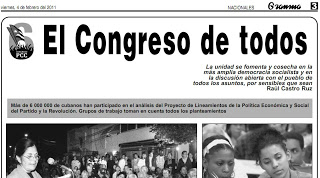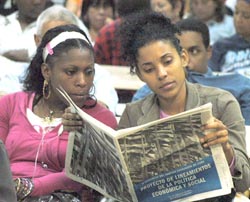Cuba USA
- Cuba Guidelines Debate Pdf English
Here is my complete English translation of the booklet Information on the results of the Debate on the Economic and Social Policy Guidelines for the Party and the Revolution, an explanatory document published together with the final version of the Guidelines...
- Sixth Party Congress Guidelines Published
The final draft of the Economic and Social Policy Guidelines for the Party and the Revolution, the key policy document approved by the Sixth Congress of the Cuban Communist Party (PCC) in April, has been published in booklet form and as a downloadable...
- Translation: Port Workers Debate Guidelines
In Australia, port workers are known as "wharfies". In the US they are known as "longshoremen", while elsewhere in the English-speaking world they are "stevedores", "dockworkers" or "dockers". Such are the difficulties of translation for a multinational...
- Translation: Enterprise, Directors And Workers
Here, a Granma reader proposes that workers be empowered to elect the directors of socialist state enterprises. The enterprise, the directors and the workers Granma letter published January 7, 2011 Translation: Marce Cameron The year 2011 brings...
- Translation: Debate Contributes Wealth Of Arguments
This brief report highlights the importance of Cuba's intellectual and artistic vanguard in the process of debates and changes aimed at renewing Cuba's socialist project. It also gives some idea of the scale of the national debate on...
Cuba USA
Translation: Everyone's Congress
Everyone's Congress
 The current process of mass participation has its antecedents in the call made by General Raul Castro in his speech of July 26, 2007, in Camaguey, when he asked the people to discuss the future of our socioeconomic development. More than 1.3 million proposals were put forward in the subsequent debates. Two years later, in the popular consultation around the speeches of compañero Raul on July 26 in Holguin, and on August 1 in the National Assembly of People's Power, nearly 2.3 million proposals for action, supportive comments, suggestions and criticisms were added.
The current process of mass participation has its antecedents in the call made by General Raul Castro in his speech of July 26, 2007, in Camaguey, when he asked the people to discuss the future of our socioeconomic development. More than 1.3 million proposals were put forward in the subsequent debates. Two years later, in the popular consultation around the speeches of compañero Raul on July 26 in Holguin, and on August 1 in the National Assembly of People's Power, nearly 2.3 million proposals for action, supportive comments, suggestions and criticisms were added.
To set off along a better path, towards preserving what we have achieved and making our socialism irreversible, takes wisdom and courage. We Cubans are not in an era of lamentations, nor of defeats, but of taking sure steps to guarantee the socialist future of the homeland. We must delve into issues of organisation, of boosting the effectiveness of oversight, of demanding more [of those with responsibilities] in the midst of a complex reality for a country which has confronted, in the past five decades, the tremendous siege that the economic war waged by 10 US administrations amounts to.
Despite all this, the people discuss and contribute [to the debate] with optimism, because a true Revolution renews itself continually; is self-critical; learns from it mistakes; never ceases to promote [ethical] values; has confidence in its youth, which have never let it down, and less so will they do it now and later on, when they have the responsibility of continuing its work with an ever-greater protagonist role in its leadership, convinced that for our people the concepts of homeland, independence and socialism are indissolubly linked.
By Alberto Nunez Betancourt
Granma, February 4, 2011
Translation: Marce Cameron
Unity is forged and reaped in the broadest socialist democracy and in open discussion with the people of all issues, no matter how sensitive they may be. Raul Castro
More than six million Cubans have participated in the analysis of the Draft Economic and Social Policy Guidelines of the [Communist] Party and the Revolution. Working groups take into account all the proposals.
* * *
 |
| Studying the Draft Guidelines |
The congress of the people is taking place in the neighbourhoods and workplaces. More than six million compatriots have participated in the analysis of the Draft Economic and Social Policy Guidelines of the Party and the Revolution, with more than 70% of the projected meetings having taken place.
With responsibility, in free and open exchanges, Cubans examine every chapter of the important text, knowing that all the interventions or proposals for additions, modifications, deletions, doubts and/or concerns are gathered meticulously. After being processed and classified according to theme, they are considered, with the help of computer specialists, by more than 5,000 specialists in every municipality and province. The proposals are then referred to the 12 working groups that worked on the elaboration of the Draft Guidelines, under the guidance of the principal leaders of the Party, state and government. These working groups are now committed to evaluating the information collected and proposing the relevant changes with a view to presenting a final draft to the 6th Communist Party Congress [in April].
The chapters eliciting the most opinions and proposals are Chapter 6, dedicated to Social Policy; Chapter 2 (Macroeconomic Policies); Chapter 1 (Economic management model); Chapter 11 (Policies for construction, hosing and water resources) and Chapter 10 (Transport policy). Of the Guidelines themselves, among the most discussed are No. 162, referring to "implementing the orderly elimination of the ration book [distribution system]..."; Nos. 61 and 61 (pricing policy); No. 133 (quality and rigour of the teacher training process); No. 278 (application of flexible arrangements for swapping, buying, selling and leasing of housing), and No. 54, referring to the process of working towards monetary unification.
But if opinions that coincide and reflect consensus are important, also valuable, worthy of respect and considered [by the experts and working groups] is the valid opinion of any citizen with regard to additions or modifications to one or more Guidelines.

Nothing has remained rhetorical. The militants of the Party and the population participate in the political process of preparation of the upcoming Congress. Once again we talk about planning, profitability, efficiency, investments, savings. The economic battle is essential because our quality of life depends on it. The Guidelines also contain the spirit of rectification of errors and negative tendencies, a logical continuity of the [Rectification] process begun in the 1980s, and which does not deserve to be truncated. The analysis of the Draft Guidelines will be the sole theme of the Party Congress in April.
To set off along a better path, towards preserving what we have achieved and making our socialism irreversible, takes wisdom and courage. We Cubans are not in an era of lamentations, nor of defeats, but of taking sure steps to guarantee the socialist future of the homeland. We must delve into issues of organisation, of boosting the effectiveness of oversight, of demanding more [of those with responsibilities] in the midst of a complex reality for a country which has confronted, in the past five decades, the tremendous siege that the economic war waged by 10 US administrations amounts to.
Despite all this, the people discuss and contribute [to the debate] with optimism, because a true Revolution renews itself continually; is self-critical; learns from it mistakes; never ceases to promote [ethical] values; has confidence in its youth, which have never let it down, and less so will they do it now and later on, when they have the responsibility of continuing its work with an ever-greater protagonist role in its leadership, convinced that for our people the concepts of homeland, independence and socialism are indissolubly linked.
- Cuba Guidelines Debate Pdf English
Here is my complete English translation of the booklet Information on the results of the Debate on the Economic and Social Policy Guidelines for the Party and the Revolution, an explanatory document published together with the final version of the Guidelines...
- Sixth Party Congress Guidelines Published
The final draft of the Economic and Social Policy Guidelines for the Party and the Revolution, the key policy document approved by the Sixth Congress of the Cuban Communist Party (PCC) in April, has been published in booklet form and as a downloadable...
- Translation: Port Workers Debate Guidelines
In Australia, port workers are known as "wharfies". In the US they are known as "longshoremen", while elsewhere in the English-speaking world they are "stevedores", "dockworkers" or "dockers". Such are the difficulties of translation for a multinational...
- Translation: Enterprise, Directors And Workers
Here, a Granma reader proposes that workers be empowered to elect the directors of socialist state enterprises. The enterprise, the directors and the workers Granma letter published January 7, 2011 Translation: Marce Cameron The year 2011 brings...
- Translation: Debate Contributes Wealth Of Arguments
This brief report highlights the importance of Cuba's intellectual and artistic vanguard in the process of debates and changes aimed at renewing Cuba's socialist project. It also gives some idea of the scale of the national debate on...
